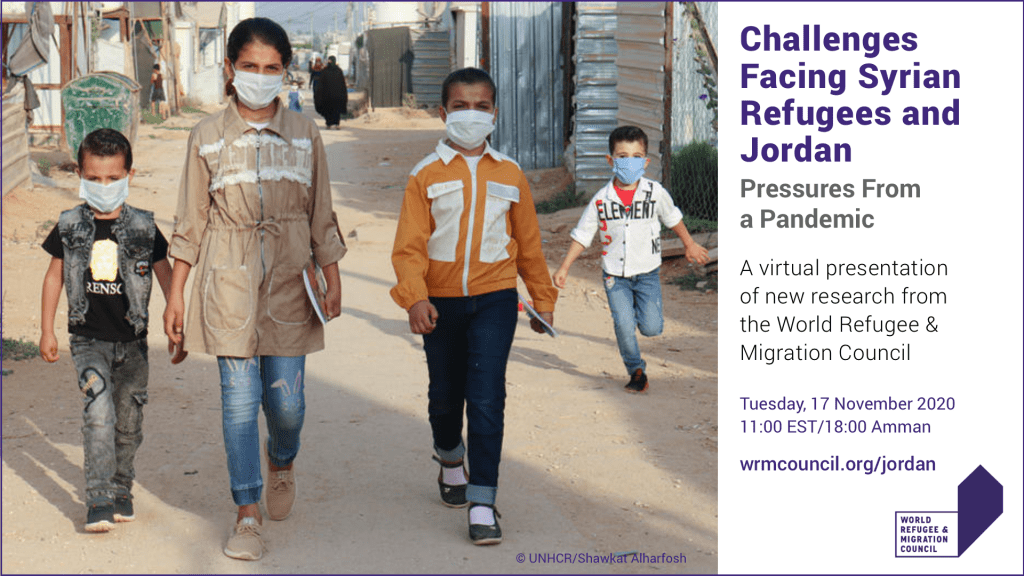By Elizabeth Ferris and Diana Rayes
El World Bank has referred to COVID-19’s impact as a ‘triple shock:’ the health risks from the pandemic itself, the economic impact of containment measures and reverberations from the global recession. For Jordan, a major refugee-hosting country, these shocks come on top of the already-heavy costs of hosting Syrian refugees, which have placed significant social, economic, and political pressures on the country in the decade since the start of the Syrian conflict. And for the estimated 1.3 million Syrian refugees in Jordan themselves, the shocks of COVID-19 have meant declining livelihood possibilities, increasing poverty and continued uncertainty about the future. Outbreaks of COVID-19 have already been reported in both camp settings in Jordan where Syrian refugee populations live, highlighting the potentially dire consequences facing countries hosting large numbers of refugee populations without measures to strengthen accountability, governance, responsibility sharing and funding mechanisms.
This week, the Consejo Mundial para los Refugiados y la Migración is launching a series of reports on the multifaceted impacts of COVID-19 on Syrian refugees in Jordan. Rasha Isaiteyeh, economist from the Hashemite University, analyzes the impact of COVID-19 on Jordan’s economy and its continued ability to host over 600,000 Syrian refugees. Oroub El-Abed and Nuseibah Shabaitah from the Centre for Lebanese Studies in Amman look at the impact of COVID-19 on Syrian refugees – both in terms of their livelihoods and their intentions regarding eventual return to Syria. Omar Asfour and Husam Allaham, public health experts based in Amman, analyze the impact of COVID-19 on conditions in Syria and conclude that the prospects for return to Syria continue to be dim — particularly given the lack of adequate reporting on the extent of the coronavirus.
WRMC Research Papers on the Impact of COVID-19 on Syrian Refugees in Jordan:
- Summary Report — Challenges Facing Syrian Refugees and Jordan: Pressures from a Pandemic (PDF)
- Summary Report — Arabic Version (PDF)
- The Economic Impact of COVID-19 on Syrian Refugees in Jordan (PDF) — Rasha Istaiteyeh
- Impact of COVID-19 on Syrian Refugees in Jordan from the Refugee Perspective (PDF) — Oroub El-Abed and Nuseibah Shabaitah
- Between Two Outbreaks: Syrian Refugees and the Consequences of COVID-19 in Syria and Jordan (PDF) — Omar Asfour and Hosam Allaham
Findings from the report indicate a stagnated Jordanian economy with a near 20% unemployment rate, particularly among youth, a fluctuating GDP, and reverberating impacts of deteriorating economies in surrounding countries, such as Iraq, Lebanon, and Syria. The Jordanian government’s swift and strict COVID-19 response effort has led to a national deficit of around US$4.5 billion, with long-term implications on livelihoods, particularly for Syrian refugee populations (of whom approximately 80% live under the poverty line). Further report findings demonstrate that certain sectors which largely employ Syrian refugees, such as tourism, construction, trade and customer service, have been significantly impacted by the pandemic. While the host community has been generous in temporarily supporting refugee communities during the initial months of the pandemic, more sustainable solutions are needed. This includes the ongoing protection of vulnerable refugee populations, particularly in continuing humanitarian assistance. Without these resources, Syrian refugees are guaranteed to be among the most impacted by the ongoing pandemic in Jordan. And while reports from 2019 indicate that about 150,000 Syrian refugees have returned from Jordan to Syria, conditions inside Syria remain too dangerous for safe and voluntary return.
Over the course of 18 months and reflecting consultations in all regions, the Council, which brings together 28 high-level representatives, issued A Call to Action with specific suggestions to transform the global refugee system so that responsibility for refugees could be more equitably shared. Providing safety and a decent living standard to 26 million refugees in a world of over 7.5 billion people is not an impossible task. However, responsibilities remain skewed – with some governments, such as Jordan, being asked to do far more than others. The Council called for the development of new tools to support refugee-hosting governments, such as using international trade and new investment tools as the frozen assets of political leaders who have displaced large numbers of people. These recommendations were made before COVID-19 appeared on the scene. But the studies released this week provide evidence that more support for refugee-hosting countries — and for refugees — is more urgently needed than ever.
These are tough times for refugees around the world as governments face intensifying pressures to extend services to their citizens in light of the pandemic and as traditional donors encounter increased needs on all fronts and in all regions. In these situations, refugees will do what they have always done in tough times — they will rely on family and friends, they will likely incur more debt, they will eat less and seek work in more precarious and perhaps more dangerous jobs. Syrian refugees have faced less stigma and discrimination in Jordan than in many other countries. But there is a danger that if the pandemic continues to claim lives, stress health systems and deplete government budgets, popular sentiment may become less hospitable toward the refugees.
Elizabeth Ferris, Research Professor at Georgetown University’s Institute for the Study of International Migration, also serves as vice-president of research for the World Refugee & Migration Council.
Diana Rayes is a PhD Candidate at Johns Hopkins Bloomberg School of Public Health and has worked extensively on Syrian refugee issues.


